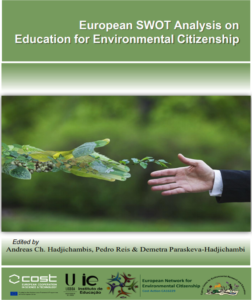Chapter 2: Short Country Report AUSTRIA
Katharina Lapin & Florian Leregger
Abstract: Environmental Education (EE) has been established in Austria’s education institutions since the 1970s and is integrated in various subjects of the curriculum. The overall aims are to understand the global context of individual actions with linkages to the environment and climate and to influence behaviour in an environmentally-friendly way. In the Austrian education system, the terminology of EE, Education for Sustainable Development (ESD), Science Education (SE) and Citizenship Education (CE) cannot be considered strictly differentiated. The outcomes of the surveys with eight experts from the Austrian education system show various strengths, weaknesses, opportunities and threats of the Education for Environmental Citizenship. The identified strengths of Education for Environmental Citizenship are the increased understanding of the environmental and social consequences of each individual citizen`s actions, empowerment, and the development of sustainable responsibilities. The weakness of Education for Environmental Citizenship is the dependence of possibilities to create a participative and motivating learning environment. Education for Environmental Citizenship provides many opportunities for reaching several targets of the Sustainable Development Goals (SDGs). The concept of Education for Environmental Citizenship is not well established in Austria and this threatens its acceptance in the Austrian society.

